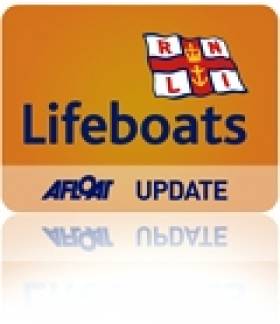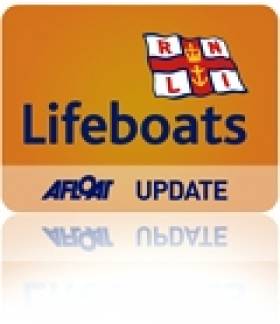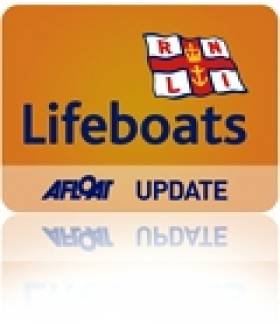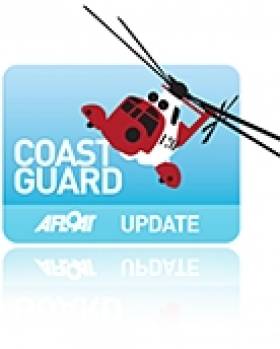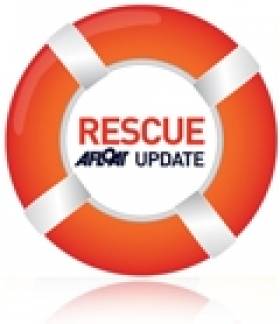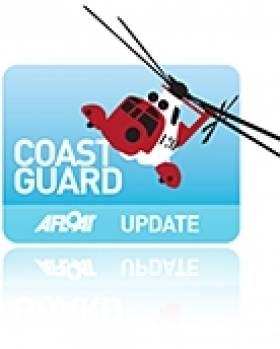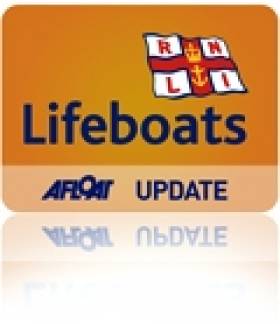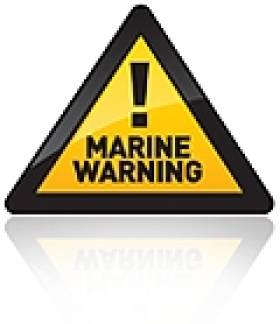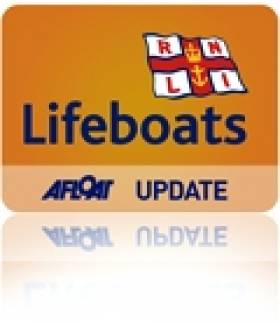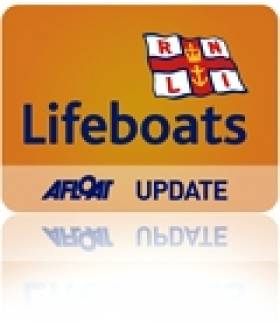Displaying items by tag: Lifeboat
The two men were on passage from Ballycastle to Scotland in a 9 metre landing craft. Their cargo shifted resulting in the vessel capsizing throwing the two men into the water. The alarm was raised shortly after 7am.
Red Bay RNLI Lifeboat crew located the men who had been in the water for over an hour two miles east of Torr Head. The men who were suffering from shock and Hypothermia were taken to Cushendall by the Lifeboat were they were met by an ambulance crew and taken to Antrim hospital.
Commenting on the rescue Red Bay RNLI lifeboat helm Paddy McLaughlin said, "The two men had been in the sea for over an hour and were feeling the effects of it as the lifeboat crew arrived. We administered first aid at the scene and transferred the casualties to shore immediately where they were met by ambulance."
This is the second callout for Red Bay volunteer lifeboat crew in 24 hours. Two divers were recovered from Cushendun yesterday afternoon after they got separated from their dive boat.
Sink or Swim RNLI Sea Safety Evening a Fantastic Success
With a vision to end preventable loss of life at sea the Royal National Lifeboat Institution are proactively engaged in delivering clear straight forward safety advice to everyone going afloat.
RNLI Volunteer Peter Bullick along with his team of presenters delivered a thought provoking sea safety message which enthralled as well as entertained all those who attended. The main message of the evening highlighted six safety tips for anyone going afloat. The RNLI use the phrase IT'S WET to help you remember this important advice.
I – Inform, Tell others where you're going.
T – Training, Knowledge of your activity is essential.
S – SOS Device, Carry a meanings of calling for help.
W – Wear a lifejacket, A life statement, not a fashion one – wear it.
E – Engine and fuel check, Have you sufficient fuel and spares?
T – Tide and weather, Check the conditions before heading out.
The RNLI's free sea safety check is offered to all boat owners.
New Lifeboat Class to be Named After River Shannon
Paul Boissier, RNLI Chief Executive, said: 'I'm delighted to announce that our latest class of lifeboat will be called the Shannon. Current and previous classes of lifeboat carry, or have carried, the names of rivers from Wales, Scotland and England, so it's fitting that our fleet now reflects the fact that our volunteers save lives at sea all around Ireland as well as the UK.'
The Shannon class lifeboat – its previous designation was the Fast Carriage Boat 2 or FCB2 reflecting that it will be predominantly launched over beaches, – harnesses cutting-edge technology to ensure that it will meet the demands of a 21st century rescue service and allow the charity's volunteer crew to do their lifesaving work as safely as possible in all weather conditions.
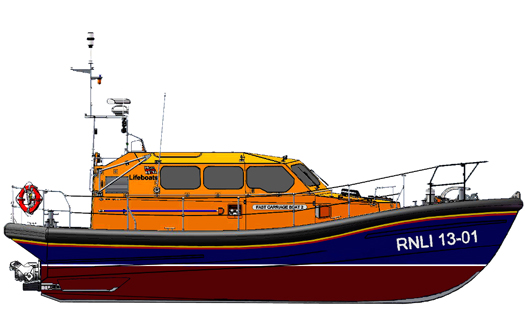
Using twin waterjets instead of conventional propellers, the Shannon class will be able to operate in shallow waters and be highly manoeuvrable. The waterjets also reduce the risk of damage to the lifeboat during launch and recovery, or when intentionally beached.
It can be launched, bow first, from a tractor and carriage and will have a top speed of 25 knots. Like the Tamar class lifeboat, the Shannon also has specially designed seats that protect the volunteer crew and SIMS (System and Information Management System), which allows the crew to monitor the boat from the safety of their seats.
Like all RNLI all-weather lifeboats, the Shannon is self-righting and will return to an upright position in the event of capsize.
Arklow Lifeboat Operations Manager and RNLI Honorary Life Governor Jimmy Tyrell has campaigned for many years for an RNLI lifeboat class to be named after an Irish river. Commenting on the announcement Jimmy said, "I am thrilled with the news, not just for myself but for everyone involved with the RNLI in Ireland. It is recognition for all the hard work of our volunteer lifeboat crewmembers, fundraisers and staff in Ireland. This has been a subject close to my heart for many years and I am delighted that it has been announced while I am still a volunteer Lifeboat Operations Manager and heavily involved with the charity. I am looking forward to seeing it onservice at lifeboat stations in a couple of years."
The Shannon will gradually replace the existing Mersey class lifeboat and will be the final step in enabling the RNLI to fulfil its operation commitment to ensure that all its operational lifeboats have a top speed of 25 knots.
Full sea trials will start later this year and the first operational Shannon class lifeboat is due to go on station in 2013.
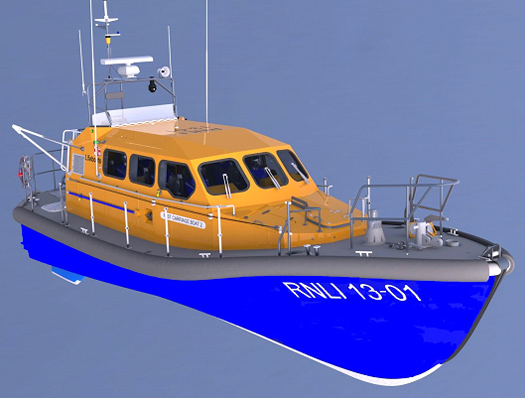
Two Crew Rescued from Sinking Boat
Liverpool Coastguard received the mayday from the 'Aurora' at 16.47, and requested the launch of the Port St. Mary RNLI Inshore and All Weather Lifeboats, along with tasking the Port Erin Coastguard Rescue Team. Another fishing vessel, 'Two Girls' overheard the mayday and proceeded to the vessel, taking the two crew members on board. Although crew members from the lifeboats attempted to pump the water from the vessel, the ingress was too much and at 17.07 the vessel sank. The crew members from the Aurora were taken back to Port St. Mary, where they were met by the Coastguard Rescue Team.
Liverpool Coastguard Watch Manager Su Daintith said:
"We would like to thank the crew of the vessel 'Two Girls' whose swift response to the Aurora's mayday this afternoon ultimately saved both of the crew members' lives."
Skerries Search Called Off as Bodies of Fishermen Found
The bodies of two fishermen missing off the Skerries coast since last Friday have been found.
Ronan Browne, 26, and David Gilsenan, 41, had not been seen since setting out from Skerries harbour on the morning of 1 April.
As previously reported by Afloat.ie, the alarm was raised when they had failed to return by 6.30pm and a coast guard search began immediately.
Naval vessels joined the operation as the search continued following the discovery of an upturned hull and an oil slick near Clogherhead, Co Louth.
According to RTÉ News, at 1.40am yesterday morning a fishing vessel discovered the bodies of the two men caught in its fishing gear some five miles east of Clogherhead. They were recovered by RNLI lifeboat.
RTÉ News has more on the story HERE.
Liverpool Coastguard Rescues 93 People
The first call came in at 13.13 when four people became stranded near Fleetwood. Fleetwood Coastguard Rescue Team proceeded to the scene and they were safely brought ashore. The Lytham Coastguard Rescue Team were then tasked to a report of 70 people cut off by the tide at Blackpool near the South Pier. With Blackpool Beach Patrol and the Blackpool RNLI Lifeboat also on scene assisting everyone was subsequently reported as safely back to the shore.
At 13.41 Liverpool Coastguard received reports of two separate groups (one of five people, and one of nine people including four children) who had become stranded on sandbanks in Blackpool off Norbreck Castle. Once again Fleetwood Coastguard Rescue Team were sent to assist in getting them safely back to the shore.
At 14.35 Liverpool Coastguard sent Arnside Coastguard Rescue Team to a woman and two dogs who were cut off by the tide at Sandside near Arnside. The Morecambe RNLI Hovercraft was launched and took the lady and her dogs back to safety.
Finally, at 14.41 Liverpool Coastguard received a call reporting four girls potentially stranded on the spit at Little Eye in West Kirby. Hoylake Coastguard Team attended to investigate but the girls were deemed to be not in danger.
Liverpool Coastguard Watch Manager Su Daintith said:
"We know that on a beautiful like today that people don't want to waste any time getting to the beach in order to soak up the sunshine. But just two minutes spent checking the tide times (and there are plenty of resources available where you can find these) could mean the difference between a carefree day and a Coastguard Team coming to your rescue."
Portrush RNLI Lifeboat to be Named
Portrush RNLI Lifeboat 'David Roultson' will be named next Saturday, April 16th. The D class lifeboat will be named at a ceremony at Portrush Lifeboat Station at 2pm.
The lifeboat has been funded through a generous contribution from the Civil Service Lifeboat Fund and will be officially named by Sir Peter Housden KCB, Chairman of the Lifeboat Fund and Permanent Secretary of the Scottish Government.
Also on Saturday a special plaque will be unveiled at the station by Mr Alan Clarke, Chief Executive of the Northern Ireland Tourist Board in memory of David Roulston. Over £25,000 was raised by the Northern Ireland Tourist Board staff and their families and friends for the upkeep and maintenance of the new inshore Portrush RNLI Lifeboat.
Robin Cardwell, Portrush Lifeboat Operations Manager who will be accepting the lifeboat on behalf of Portrush RNLI lifeboat station says; “It is fitting that we honour both these contributions in the name of our new lifeboat. This lifeboat is the vessel that will carry our volunteer lifeboat crew out to sea to save lives and on it our lifeboat crew will learn and develop their skills through extensive training.”
The D class lifeboat is built at a cost of £31,000. It measures five metres in length and can carry three crewmembers onboard. It is a fast, light weight inflatable that is small and highly manoeuvrable, making it ideal for rescue close to shore in fair to moderate conditions. It can also be righted manually by the lifeboat crew in the event of a capsize.
All are welcome to attend the naming ceremony which will be held outside the lifeboat station in Portrush. There will be a special service of dedication and blessing and the lifeboat will put to sea after the ceremony.
Launching? Check Your Boat Maintenance
"Many of the water-based incidents that we deal with at this time of year involve engine breakdown as a result of lack of maintenance," says Garry Hall of the UK's Solent Coastguard. "People report running out of fuel, sometimes because fuel indicators are broken or because fuel can't get through pipes and the engine is starved. Electrical issues are also a frequent problem. Often oxidation happens if engines are laid open to the elements and it affects the wiring. Engines are susceptible to frost so following our cold winter they will certainly need a good service."
Ideally attend a Diesel engine maintenance course, see:
www.rya.org.uk/coursestraining/courses/specialist/Pages/Diesel.aspx
Whilst you're considering maintenance, don't forget to look at your lifejackets and make sure that they are functioning fully. Remove the cylinders and auto-mechanisms, washing them in fresh water. Now inflate the lifejackets using a hand pump, leaving them for 24 hours to make sure that they don't deflate. Then reassemble the lifejacket, ensuring that the cylinder is screwed back in securely. The RNLI have some good advice about how to maintain your lifejacket on their website. Go to www.rnli.org.uk/seasafety
Appropriate and fully functioning communications equipment will be vital should you find yourself in an emergency situation. Have you got all the right equipment?
Check all your existing communication equipment. Ensure your VHF DSC radio unit's MMSI registration is up to date with Ofcom so that the Coastguard has the right emergency contact details. If you have an emergency position-indicating radio beacon (EPIRB) or a personal locator beacon (PLB), replace batteries before they expire and don't just rely on the "test" button. Also ensure the beacon's registration details are up to date so that the Coastguard has the right emergency contact details and correct information for both yourself and your vessel.
Donations Vital for RNLI Service
Charlie McGibney (pictured below) presented a cheque recently to David Buttimer, chairman of the Fenit RNLI lifeboat fund-raising committee, for donations received at the funeral of his loving wife Ita McGibney.
It was Ita's request that donations made during her funeral be presented by her husband Charlie to Fenit RNLI Lifeboat Station, based at Fenit Harbour in Co Kerry.
The RNLI (Royal National Lifeboat Institution) is a registered charity and depends on voluntary donations and legacies to maintain its rescue service.
The death of Ita McGibney (neé Clonan) of Tieraclea Park, Tarbert and formerly of Dumcondra, Dublin, occurred on 20 February 20 2011. Ita is survived by her husband Charlie; sons Tom, George, Gerard, John, Raymond, Damien, Rory and Simon; daughter Dr Carol (Pierce); brother Pat; sisters Mary and Ann; as well as in-laws, grandchildren, great-grandchildren, nephews, nieces and friends.
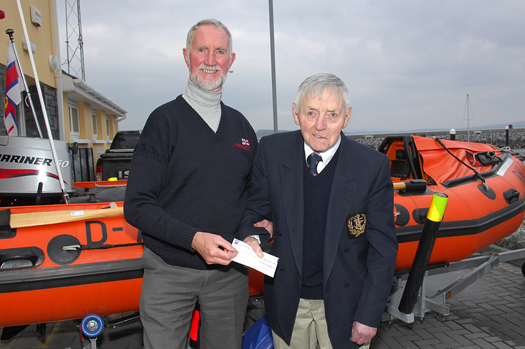
Photograph by Digimac Photography, Fenit
Crew Brought to Safety by Dun Laoghaire Lifeboat
The pair anchored their boat as a precaution and awaited the arrival of the lifeboat that was already at sea on a routine exercise less than two miles away.
A towline was passed to the vessel and was taken to safety and brought alongside at Dun Laoghaire.
Related Safety posts
RNLI Lifeboats in Ireland
Safety News
Rescue News from RNLI Lifeboats in Ireland
Coast Guard News from Ireland
Water Safety News from Ireland
Marine Casualty Investigation Board News
Marine Warnings



























